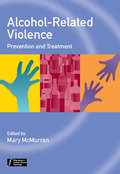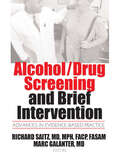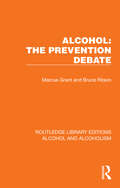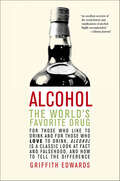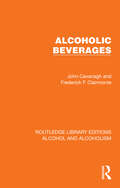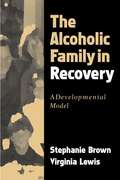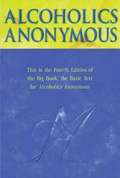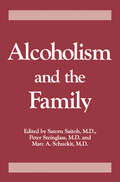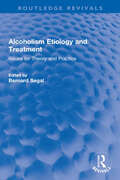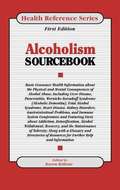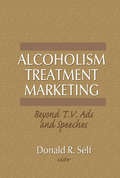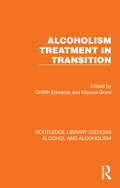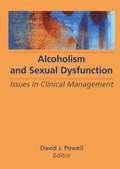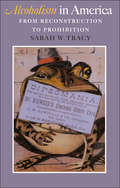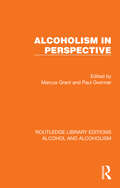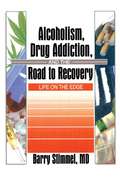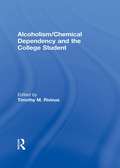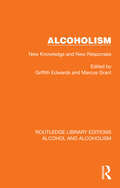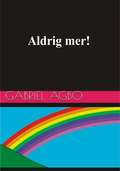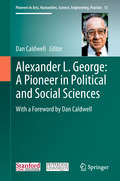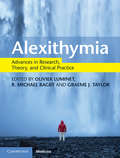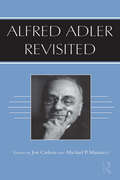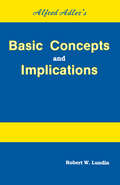- Table View
- List View
Alcohol-Related Violence: Prevention and Treatment
by Mary McmurranNew in the Wiley Series in Forensic Clinical Psychology, Alcohol-Related Violence: Prevention and Treatment presents an authoritative collection of the most recent assessment and treatment strategies for alcohol-related aggression and violence. Features contributions from leading international academics and practitioners Offers invaluable guidance for practitioners regarding intervention to reduce alcohol-related aggression and violence Describes evidence-based interventions at a number of levels, including populations, bar room, families, couples, and individuals
Alcohol/Drug Screening and Brief Intervention: Advances in Evidence-Based Practice
by Richard Saitz Mark GalanterGet a better understanding of what is known and what is not known in this widespread practice Screening and brief intervention (SBI) has been around for over 40 years and is a widely recognized practice. Alcohol/Drug Screening and Brief Intervention: Advances in Evidence-Based Practice provides a valuable exploration of the present literature, the effectiveness and cost-effectiveness of screening and brief intervention, and methodological challenges in studying these practices. Respected leaders in the field discuss ways to measure the use of screening and brief intervention in practice, the multiple risk factor context in which unhealthy alcohol use occurs, clinician training issues, effective strategies to screen adolescents, which patients are most likely to change from SBI, and what research is needed in the future. Screening and brief intervention are presently being used in numerous settings such as hospitals, primary care settings, trauma centers, and college health services. Alcohol/Drug Screening and Brief Intervention: Advances in Evidence-Based Practice examines in detail original research and cutting edge research issues in these settings to provide an important review of what is known and what is not known about the practice. Methodological issues are extensively discussed. This valuable book provides crucial information on the detection of small effects, standards of analysis, reporting, interpretation, the risks of bias, and the need to ensure that results have the potential to be applied in practice. Health professionals and addiction specialists get an important critical re-evaluation of the growing practice and are provided direction for future research. Other topics in Alcohol/Drug Screening and Brief Intervention: Advances in Evidence-Based Practice include: results of research on screening, brief intervention, and referral to treatment (SBIRT) exploration of data assessing the effectiveness of screening and brief alcohol intervention evaluation of clinical alcohol screening with the AUDIT-C cost-effectiveness and cost-benefit of SBI in medical settings research into SBIRT for Emergency Departments data on primary care patients with multiple risk factors research on feasibility and efficacy of "no-contact" interventions and more! Alcohol/Drug Screening and Brief Intervention: Advances in Evidence-Based Practice is essential reading for alcohol and drug researchers, screening and brief intervention program practitioners, physicians, nurses, health promotion advocates, Public Health Practitioners, and the State Departments of Public Health.
Alcohol: The Prevention Debate (Routledge Library Editions: Alcohol and Alcoholism)
by Marcus Grant Bruce RitsonIn the early 1980s, emphasis had shifted from the treatment of alcohol problems to their prevention. Yet no clear integrated policy yet existed about how alcohol problems could best be prevented. Many different strategies were put forward as solutions but some were in competition with each other, while some were actually incompatible. Originally published in 1983, what this book does is to draw together a cross section of these different and competing voices so as to give a sense of the quality and direction of the great alcohol debate at the time. After setting into context some of the basic questions to do with the prevention of alcohol problems, the authors knit together and juxtapose short contributions from a very wide variety of experts from around the world. Clinicians, educators, sociologists, advertisers, marketing men, economists, philosophers, geneticists and international civil servants present different points of view on health education, the media, advertising, trade, the law, the environment and on the ethical basis of the debate itself. The authors bravely attempt to pull some general sense out of this profusion of what the way ahead is likely to be. It should be noted that this reissue very much reflects the context of the times in which it was written and that the contributors were participating in a debate where differences of opinion were actively encouraged.
Alcohol: The World's Favorite Drug
by Griffith EdwardsAlcohol can be an item of diet, a medicine, sometimes an element in religious ritual. It is a valued object for the connoisseur, a traded commodity and a symbol of national pride (wine for instance in France, whisky in Scotland). The range of social and medical problems associated with alcohol and the history of related treatment methods (including the temperance movement, prohibition, AA and a range of contemporary approaches) are considered here. Already considered a classic in the field in England, Alcohol has proved to be fascinating reading for drinkers and nondrinkers alike.
Alcoholic Beverages (Routledge Library Editions: Alcohol and Alcoholism)
by John Cavanagh Frederick F. ClairmonteFor most of the post-war period, alcohol problems had been viewed primarily as individual problems. During the 1970s and 1980s, research highlighted the importance of larger socio-economic factors in shaping drinking levels, patterns and problems. However, it largely ignored a paramount force which shaped this larger socio-economic environment: the modern multinational corporation. The aim of this book, originally published in 1985, was to demonstrate, on the basis of historical analysis, that transnational corporate structures and marketing strategies exercised a powerful impact on the availability and consumption of alcoholic beverages in both developed and developing marketing economies. While the authors did not want to suggest a single causal relationship between corporate strategies and the consumption of alcoholic beverages, the implications of their work were of the greatest significance to public health throughout the world. The book was an indispensable work for those interested in public health, alcoholism, and multinational business at the time. Today it can be read in its historical context.
Alcoholic Family in Recovery
by Stephanie Brown Virginia M. LewisMost treatments for alcoholism have focused on abstinence as their final goal and emphasize brief interventions with the addicted individual. But family relationships change dramatically when the alcoholic stops drinking in fact, stress, turmoil, and uncertainty are the norm. This volume details how to help families regroup after abstinence, ride out periods of emotional upheaval, and find their way to establishing a more stable, yet flexible, family system. Using a compelling case-study format to illustrate the process of change, the book presents the moving personal experiences of families at different stages of the recovery process. Expanding the therapist's role to include psychoeducation and supportive counseling, the authors provide pointers for assessment at key stages of recovery and guide clinicians through bringing about lasting change.
Alcoholics Anonymous: The Story Of How Many Thousands Of Men And Women Have Recovered From Alcoholism
by Alcoholics Anonymous World ServicesIt's more than a book. It's a way of life. Alcoholics Anonymous-The Big Book-has served as a lifeline to millions worldwide. First published in 1939, Alcoholics Anonymous sets forth cornerstone concepts of recovery from alcoholism and tells the stories of men and women who have overcome the disease. With publication of the second edition in 1955, the third edition in 1976, and now the fourth edition in 2001, the essential recovery text has remained unchanged while personal stories have been added to reflect the growing and diverse fellowship. The long-awaited fourth edition features 24 new personal stories of recovery. Key features and benefits +the most widely used resource for millions of individuals in recovery +contains full, original text describing A. A. the program +updated with 24 new personal stories.
Alcoholism And The Family
by Peter Steinglass Saturo Saitoh Marc A. SchuckitThe science of the etiology and treatment of alcohol has made notable progress in recent years. Since the early 1970s there have been growing in-roads made concerning the relevance of hereditary factors in alcoholism. This has led to the presentation of various innovative hypotheses in this field. In conjunction with this there has been much discussion and study of the "alcoholic personality" and its possible characteristics. These may be considered the "longitudinal aspects" linked to the transmission of alcoholism.
Alcoholism Etiology and Treatment: Issues for Theory and Practice (Routledge Revivals)
by Bernard SegalFirst published in 1988, Alcoholism Etiology and Treatment provides a stimulating discussion concerning an understanding of the etiology and treatment of alcoholism. Divided into five chapters, it brings themes like the disease concept of alcoholism; interdisciplinary biobehavioral research on alcohol problems; sociocultural and organizational bases of support for alcohol treatment; genetic predisposition to alcoholism; and anthropological perspectives on prevention and intervention, to provide a forum for discussion of some of the issues that prevail in the field of alcoholism. This book is an essential read for students and scholars of addiction studies, psychology, sociology, and behavioural studies.
Alcoholism Sourcebook
by Karen BellenirPresents a wealth of information on alcohol use and abuse and its effects on the body and mind, treatment, and prevention. Separate sections focus on use and abuse, physical effects, alcohol and pregnancy, alcohol and the brain, treatment and recovery, and prevention. A final section offers a glossary, a list of resources for people seeking help with recovery, a directory of general information resources, and a list of state substance abuse agencies. Material comes from publications issued by US government agencies, as well as organizations and professional journals. For general readers. Annotation c. Book News, Inc., Portland, OR (booknews.com)
Alcoholism Treatment Marketing: Beyond T.V. Ads and Speeches
by Donald SelfThe annual economic burden of alcohol abuse in the United States is staggering, yet the alcoholism treatment industry has been historically plagued by governmental regulations, moral crusades, advocacy of specific treatment approaches, and a lack of marketing knowledge. Here is the first focused set of research on the marketing of alcoholism treatment services. The authors of this much-needed volume--reputable marketing and research scholars--greatly expand the current base of knowledge concerning the alcohol treatment marketing subdiscipline, including the referral system analyses of market potentials for providers, promotional effort consultation for new providers, and the evolving nature of medical services distribution systems. Through in-depth interviews with treatment providers, referral sources, and former clients of treatment facilities, and in major reviews of literature on the subject, Alcoholism Treatment Marketing presents primary research and general research findings to provide practical marketing implications.
Alcoholism Treatment in Transition (Routledge Library Editions: Alcohol and Alcoholism)
by Griffith Edwards Marcus GrantOriginally published in 1980, the purpose of this book was to aid a process of rethinking alcoholism treatment. Such a process was already underway in many parts of the world at the time. It was hoped that this volume would be useful in the modest role of abetting such a rethinking. Alcoholism treatment was definitely in transition, abandoning old certainties, searching for new syntheses and that is the position this book takes looking for an alternative understanding. The book is divided into six parts: Transition as Challenge; Does Treatment Work?; Towards Better Questions and Better Methodologies; Treatment System as Case For Study; Models in Transition; and Alcohol Agendas. The book also contains one chapter that discusses alcoholism treatment in a developing country, not often addressed at the time but acknowledgement that the problem is a global one.
Alcoholism and Sexual Dysfunction: Issues in Clinical Management
by Bruce CarruthExperts provide specific methodologies for clinicians working with recovering alcoholics and their families. This landmark study of sexual issues in alcoholism treatment addresses impotence in male alcoholics, the sexual dynamics of the client-counselor relationship, homosexual alcoholics, and many other important issues.
Alcoholism in America: From Reconstruction to Prohibition
by Sarah W. TracyDespite the lack of medical consensus regarding alcoholism as a disease, many people readily accept the concept of addiction as a clinical as well as a social disorder. An alcoholic is a victim of social circumstance and genetic destiny. Although one might imagine that this dual approach is a reflection of today's enlightened and sympathetic society, historian Sarah Tracy discovers that efforts to medicalize alcoholism are anything but new.Alcoholism in America tells the story of physicians, politicians, court officials, and families struggling to address the danger of excessive alcohol consumption at the turn of the century. Beginning with the formation of the American Association for the Cure of Inebriates in 1870 and concluding with the enactment of Prohibition in 1920, this study examines the effect of the disease concept on individual drinkers and their families and friends, as well as the ongoing battle between policymakers and the professional medical community for jurisdiction over alcohol problems. Tracy captures the complexity of the political, professional, and social negotiations that have characterized the alcoholism field both yesterday and today.Tracy weaves American medical history, social history, and the sociology of knowledge into a narrative that probes the connections among reform movements, social welfare policy, the specialization of medicine, and the social construction of disease. Her insights will engage all those interested in America's historic and current battles with addiction.
Alcoholism in Perspective (Routledge Library Editions: Alcohol and Alcoholism)
by Marcus Grant Paul GwinnerIn the 1970s, an important change of emphasis had occurred in the field of alcoholism. Instead of seeing alcoholism as an ‘all or none phenomenon’ it was now recognised that a continuum of alcohol problems existed so that individual cases could show different degrees of dependence and different degrees of harm. Originally published in 1979, this book examines the implications of this change of emphasis. It looks at definitional, aetiological, epidemiological and socio-cultural questions and contains contributions from acknowledged experts in all of these areas. The scientific evidence in each area is fully reviewed and made comprehensible to the non-specialist reader and similarities between trends in thinking in different fields are emphasised. In addition, the book analyses the implications of the modern view of alcohol problems in terms of their theoretical basis and their practical application. A rational and pragmatic approach to the problems of working with alcoholics is analysed in some detail so that the links between new ideas and their manifestation in clinical practice are made clear. At the time, this book represented a multi-disciplinary approach to a complex problem where previous thinking had been clouded by too ready acceptance of untested hypotheses.
Alcoholism, Drug Addiction, and the Road to Recovery: Life on the Edge
by Barry StimmelGain a fuller understanding of substance addiction and treatment options!Originally published in 1992 as The Facts About Drug Use, this updated edition contains new information about the effects of alcohol and recreational, mood-altering drugs on the body. The multiple causes of drug use and the options available to those dependent on drugs as a way of life are thoroughly and clearly described. Drug use affects nearly 1 out of 2 Americans and cuts across every social and economic boundary. The effects of addiction on the individual are great, and the cumulative effects on society are staggering. Knowledge of the adverse effects of mood-altering drugs and why and how they are used excessively is a centerpiece of this book. It presents, intelligently and interestingly, ways to identify persons at risk and identify problems that the addicted encounter in attempts to become drug free. Alcoholism, Drug Addiction, and the Road to Recovery: Life on the Edge is an essential tool in both finding available resources for drug users and developing appropriate responses to today's drug problem.This remarkable, well-referenced book enables those with little or no background in science or health care to understand the complex issues surrounding drug use. It provides current, reliable, and unbiased information on methods for dealing with dependency upon alcohol and central nervous system depressants, hallucinogens, heroin, nicotine, marijuana, caffeine, amphetamines, designer drugs like Ecstasy, and steroids. A glossary listing common street names for drugs will be invaluable to those interested in identifying specific substances.This comprehensive volume will show you: who typically uses drugs and the reasons why they do how to classify mood-altering drugs how to identify and treat drug dependency areas of special concern such as multiple drug use, AIDS and drug use, drugs and pregnancy, drugs and sports, and drug testing technologyChapter by chapter, this nonjudgmental book helps readers develop a better understanding of the effects of mood-altering substances and the reasons many continue to use them despite serious consequences. This is a valuable key to the nature of dependency and addiction, and the external forces (including poverty and homelessness) that promote such behavior.
Alcoholism/Chemical Dependency and the College Student
by Leighton Whitaker Timothy RivinusProfessionals who work with college students--and college students themselves--address the current epidemic of drug use on college campuses in this timely book. In acknowledging that substance abuse problems proliferate during college and on into adult life when they then affect the next generation, the outstanding group of contributors offers forthright and clear descriptions, explanations, and suggestions for helping students, including examples of university services that have proven successful in dealing with student substance abuse. This helpful book aims to reverse the trend of ambivalence and confusion of administrators and college counselors regarding the area of substance use disorder by providing practical intervention strategies.
Alcoholism: New Knowledge and New Responses (Routledge Library Editions: Alcohol and Alcoholism)
by Griffith Edwards Marcus GrantOriginally published in 1977, alcoholism was acknowledged to be a seriously growing problem in many parts of the world. It is a complex disorder with psychiatric, physical, psychological and social aspects, having far reaching harmful effects on the family and society, as well as on physical and mental health of the alcoholic themself. At the time of original publication it had been estimated that in England and Wales 11 out of every 1,000 in the adult population had a serious drink problem, and alcoholism was a major cause of admission to psychiatric and general hospitals. Alcoholism was a medico-social problem of such magnitude that this comprehensive volume, embodying advances in knowledge of causation, treatment and prevention filled an urgent need at the time. Still a major concern today this reissue can be read in its historical context.
Aldrig Mer!
by Gabriel Agbo”Och jag skall gottgöra er för åren som slukades av gräshopporna, av gräsbitarna, gräsätarna och gräsgnagarna – min stora här som jag sände mot er. Då skall ni äta och bli mätta och prisa HERREN, er Gud, som har handlat så underbart mot er. Och aldrig mer skall mitt folk stå med skam. Då skall ni inse att jag finns mitt i Israel, att jag, HERREN, är er Gud, jag och ingen annan. Och aldrig mer skall mitt folk stå med skam.” Joel 2:25-27 Det är dags att stoppa det som vill stoppa dig. Det är Guds vilja att stoppa allt som vill ta dig bort från hans planer för ditt liv. Du vet redan att Hans plan för dig är att ha det bästa av glädje, frid, välstånd, barmhärtighet, god hälsa, och att äga alla dina ägodelar. Även om du är under Hans domslut just nu kan det vändas idag, och du kommer på nytt att börja simma i hans nåd. Vi tittar också på andras erfarenheter, och det moderna Israels version av Aldrig mer!. Varför antog de denna slogan, och hur långt har de gått för att genomdriva den? Israel är en av de mäktigaste nationerna på jorden idag (de har den bästa intelligenta organisationen – Mossad – och den tredje bästa armén i världen) inte bara för att Gud är med dem, utan för att de också har lovat att aldrig tillåta judarna genomgå de mest omänskliga behandlingar, smärtor, sorg och dödsfall som de upplevde under de olyckliga, undvikbara händelserna under förra seklet. Idag leder Israel inte bara inom försvar utan också inom jordbruk, IKT, vetenskap och medicin. Ja, vi kan sannerligen säga Aldrig mer! idag! Du kommer att läsa kapitel som Aldrig mer!, Vad orsakade detta?, Se på regnbågen, Undantagets förbund, Var är ditt altare?, Att återuppbygga det förstörda altaret, ”Hämta åt mig en skål”, och Israel säger ”Aldrig mer!”. Denna bok är sannerligen intressant läsning.
Alessitimia Un Mondo Senza Emozioni
by Juan Moises de la Serna Olivia Jois NigrisoliL'Alessitimia è un problema più frequente di quanto non si creda, che rende difficile la convivenza con le persone che ne sono affette. Da qualche anno a questa parte gli psicologi stanno facendo uno sforzo per divulgare l'importanza dell'Intelligenza Emotiva e il modo di utilizzarla a favore proprio e degli altri. Questo libro si unisce a quello sforzo di divulgazione, cercando di fornire le risposte a domande su cosa siano le emozioni, su come influenzino le nostre decisioni e, soprattutto, su come possiamo servircene nella nostra vita quotidiana. Scopra tutti i concetti chiave riguardanti l'Alessitimia e come prevenirla. Nel caso in cui ne fosse affetto impari come trovare la soluzione, in modo da migliorare le sue relazioni interpersonali.
Alex: The Life of a Child
by Frank DefordFrank DeFord tells the heartbreaking, yet uplifting story of his daughter Alex's brief life. She died of cystic fibrosis at the age of eight.
Alexander L. George: With a Foreword by Dan Caldwell (Pioneers in Arts, Humanities, Science, Engineering, Practice #15)
by Dan CaldwellAlexander L. George was one of the most productive and respected political scientistsof the late twentieth century. He and his wife, Juliette George, wrote one of the firstpsychobiographies, and Professor George went on to write seminal articles and booksfocusing on political psychology, the operational code, foreign policy decisionmaking,case study methodology, deterrence, coercive diplomacy, policy legitimacy, and bridgingthe gap between the academic and policymaking communities. This book is the firstand only one to contain examples of the works across these fields written by AlexanderGeorge and several of his collaborators.• This is a collection of Alexander L. George's works from the major fields to whichhe contributed.• There are biographical essays by his wife and co-author (Juliette L. George), daughter(Mary George Douglass), former student (Dan Caldwell), and professional colleague(Janice Gross Stein).• There are 25 photographs of Alexander L. George and his family which have notpreviously been published.
Alexithymia: Advances in Research, Theory, and Clinical Practice
by Olivier Luminet R. Michael Bagby Graeme J. TaylorAlexithymia is a personality trait characterised by difficulty identifying and describing subjective emotional feelings, a restricted imagination, and an externally oriented style of thinking. Individuals with high levels of this trait are at risk of developing several common psychiatric disorders. The concept of alexithymia has evolved considerably over the past twenty years, and this important new work responds to the need for a definitive book on the subject. The research, theory and clinical issues surrounding alexithymia are discussed in depth, examining the psychological, biological and social aspects of the construct and their related outcomes. Featuring contributions from researchers and clinicians in the field of emotion processing and regulation, chapters include methods for assessing and reducing alexithymia, and research findings from diverse fields of scientific enquiry including genetics, neuroimaging studies, emotion regulation, attachment and trauma research, and comorbidities with a number of psychiatric and medical disorders.
Alfred Adler Revisited
by Jon Carlson Michael P. ManiacciAlfred Adler was one of the most influential thinkers in psychotherapy – a physician, psychiatrist, author, and professor who wanted to answer the questions that plagued people during a significant time in history. His original ideas serve as a foundation for most modern theories of counseling and psychotherapy, ideas and writings that are brought back to life in this volume. Within, contemporary experts comment and introduce Adler's work through the lens of the 21st century. In doing so, they pay tribute to, analyze, and disseminate his classic, seminal papers that have significantly impacted the therapy field. The 23 papers included were chosen because of their relevance to today's issues, and their importance in Adlerian theory and practice. They detail the core elements of his theory, the tactics he used to advocate change in individuals and systems, and emphasize how contemporary his ideas are. Alfred Adler Revisited not only plays homage to a great professional, it revives his ideas and encourages debate over fundamental human issues.
Alfred Adler's Basic Concepts And Implications
by Robert W. LundinFirst published in 1989. Routledge is an imprint of Taylor & Francis, an informa company.
